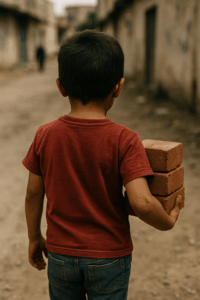
Feeling Sorry Isn’t Enough To Educate A Child
We all pause when we see it: a child carrying bricks instead of books. Selling tissues instead of solving math problems. The image stops us. We feel sorrow. We might share a post. Maybe even donate. And then, we move on. But the question lingers: is feeling sorry enough to educate a child?
On one of our visits to Syria, as we walked through a newly opened learning center, we met Sham. She was a small second grader with big eyes, but she couldn’t read, write, or even remember the simplest letters. The war had taken away not only her classrooms but also her confidence. Her family, already struggling to make ends meet, couldn’t dream of hiring a tutor.
This center had been established to give children like Sham a chance to start again, offering retention support for students pushed out of learning by war and displacement, psychosocial services to help them heal, and specialized care for children with learning difficulties or disabilities. It was more than a school; it was a place to rebuild dignity.
And Sham’s spark returned. With patient support, she began sounding out words, then reading fluently, then writing her thoughts with pride. By the end of the year, she was raising her hand with curiosity, asking questions that showed her confidence was back. Her progress wasn’t just academic, it was the return of her future.
Sham is not alone!
We also met Omar, who first came to a center at just six years old. He carried the heavy burden of severe dyslexia, cruel bullying, and the quiet wounds of war that left him withdrawn and hopeless. At first, even a single word felt impossible, and his confidence had all but vanished. Yet little by little, letter by letter, he began to rebuild. Despite displacement, despite hardship, Omar kept going. Today, he reads with ease, understands what he learns, and most importantly, he finally believes in himself again.
But for millions of children, that future is slipping away. Education in crisis zones remains fragile. Even when classrooms reopen, trauma, poverty, and lack of support turn schools into hollow spaces. And empathy without action lets these children fade into statistics.
Across the Global South, and painfully visible in Syria, children are too often treated as income generators rather than the change-makers they were born to be. Sympathy, without sustained commitment, doesn’t rebuild schools, restore learning, or heal the scars of war. At the heart of real development lies education. It is more than literacy, it is dignity, opportunity, and hope. That is why Sustainable Development Goal 4 (SDG4) calls for inclusive, equitable, quality education for all. But in fragile, conflict-affected countries like Syria, this dream remains on life support.
The numbers are stark!
Since the war began, over 7.4 million Syrians have been displaced internally and more than 5.6 million have fled abroad. Education became a silent victim. More than 7,000 schools were damaged or destroyed, many converted into shelters. According to UN OCHA, over 30% of schools are non-functional, and in Northeast Syria, 14% remain closed due to damage or displacement use. Even where schools are open, resources are scarce: electricity is unstable, water and sanitation are inadequate, and teachers are underpaid or absent. Many children return after years out of school, forced to sit in classrooms far below their age level. The result? Frustration, shame, and eventual dropout.
The psychological cost is even higher. One in four students in conflict-affected zones struggles with literacy, and many never learn to read by sixth grade. Trauma, PTSD, and anxiety weigh on their ability to focus, remember, or thrive. Without psychosocial support, classrooms risk becoming places of silence rather than growth. And outside of school, children face even greater dangers: exploitation for labor, early marriage, and abuse. Education is not just about learning, it is protection.
And yet, resilience endures. Families keep returning. Teachers keep showing up. Children keep dreaming. But return brings new challenges too: children coming back from countries like Turkey face unfamiliar curricula, language barriers, and outdated systems. Few diagnostic services exist for learning difficulties. Most families cannot afford special education or mental health support. Many don’t realize their child is struggling until it’s too late.
The question is: can progress still be possible?
The answer is yes. Beyond Syria, other contexts show what works when education is treated as urgent infrastructure. In Andhra Pradesh, India, a personalized learning program delivered nearly two years of learning in just 17 months. In rural Malawi, adaptive learning tablets achieved 4.2 months of literacy progress in 13 months, at a cost so low it returned $106 of social benefit per $1 invested. UNESCO highlights key strategies: consistent funding, teacher investment, digital innovation, and inclusive systems. Even in emergencies, phone tutoring has proven scalable, low-cost, and effective when classrooms are inaccessible.
These aren’t outliers; they’re beacons. They show that with strategy, investment, and courage, transformation is possible even in fragile settings. And this matters, because the crisis is vast: today, 224 million children worldwide need urgent educational support, and 72 million are completely out of school due to conflict, displacement, or disaster.
So yes, we feel. We empathize. But feeling alone isn’t enough.
What transforms sorrow into change is strategy. We need schools rebuilt as lifelines, with safe infrastructure, trained educators, and healing at their core. We need scalable models, adaptive tech, phone tutoring, localized curricula, that work in fractured systems. And above all, we must see education not as temporary relief, but as resilient infrastructure, anchored in equity and action.
Sham’s and Omer’s story from Syria shows what’s possible. Millions more are waiting. Sympathy may stop us in our tracks, but action moves us forward.
The question returns: when you stop at an image of a child in crisis, ask yourself: is feeling sorry enough to educate a child? Because only bold, sustained action can carry them from sorrow to school, and from there, to a future that belongs to them.


